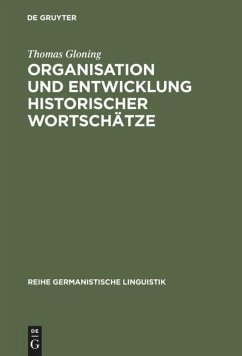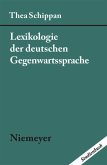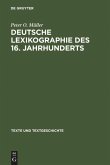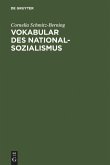Vocabularies are complex structures. This complexity derives on the one hand from the large number of elements (words and their usages) and on the other from the fact that there are a multiplicity of structuring principles at work. We can regard the development of vocabulary as the interplay between factors favouring both stasis and change in complex systems. The aim is to describe, document, and, if possible, explain this interplay. The book has two major objectives, (a) lexicological: developing a coherent 'pragmatic' conception of the organization and dynamics of vocabulary, and (b) empirical: using this conception to describe German vocabulary around 1600 and - in a longitudinal study - to chart the astonishing history of cross-referential vocabulary in German.
Wortschätze sind auf komplexe Weise strukturiert. Diese Komplexität des Wortschatzaufbaus beruht zum einen auf der großen Zahl der Elemente (Wörter, ihre Verwendungsweisen), zum anderen auf der Tatsache, daß eine Mehrzahl von Strukturierungsprinzipien zusammenwirken. Wortschatzentwicklung kann man auffassen als ein Zusammenspiel zwischen Aspekten der Beharrung und des Wandels komplexer Ordnungen, das zu beschreiben, zu dokumentieren und nach Möglichkeit auch zu erklären ist.
Dieses Buch verfolgt zwei wesentliche Ziele: (i) im Bereich der Lexikologie: die Entwicklung einer zusammenhängenden "pragmatischen" Konzeption der Wortschatzorganisation und der Wortschatzdynamik; (ii) im Bereich der empirischen Beschreibung des Deutschen: die Anwendung dieser Konzeption in der Beschreibung des deutschen Wortschatzes um 1600 und in einer Längsschnitt-Studie zur erstaunlichen Geschichte des Querverweis-Wortschatzes im Deutschen.
Wortschätze sind auf komplexe Weise strukturiert. Diese Komplexität des Wortschatzaufbaus beruht zum einen auf der großen Zahl der Elemente (Wörter, ihre Verwendungsweisen), zum anderen auf der Tatsache, daß eine Mehrzahl von Strukturierungsprinzipien zusammenwirken. Wortschatzentwicklung kann man auffassen als ein Zusammenspiel zwischen Aspekten der Beharrung und des Wandels komplexer Ordnungen, das zu beschreiben, zu dokumentieren und nach Möglichkeit auch zu erklären ist.
Dieses Buch verfolgt zwei wesentliche Ziele: (i) im Bereich der Lexikologie: die Entwicklung einer zusammenhängenden "pragmatischen" Konzeption der Wortschatzorganisation und der Wortschatzdynamik; (ii) im Bereich der empirischen Beschreibung des Deutschen: die Anwendung dieser Konzeption in der Beschreibung des deutschen Wortschatzes um 1600 und in einer Längsschnitt-Studie zur erstaunlichen Geschichte des Querverweis-Wortschatzes im Deutschen.








